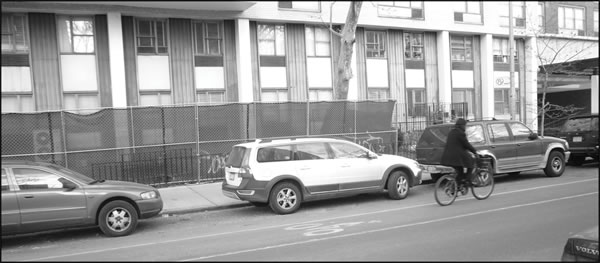By Albert Amateau
New York University will begin excavation for the cleanup of the Dec. 6, 2009, oil leak at Washington Square Village — with continued monitoring of air quality and groundwater — in the next week or so, university officials told residents and Community Board 2 representatives on Jan. 5.
While about 5,000 gallons of the leaked No. 6 heating oil was removed soon after the leak was discovered from two tanks in the boiler room and underground areas in front of 3 and 4 Washington Square Village, about 11,000 gallons of congealed oil in the soil must be removed as part of a deeper remediation.
Beth Morningstar, N.Y.U. assistant vice president for strategic initiatives in the university operations division, promised anxious Washington Square Village residents that she would respond to calls around the clock from residents during the cleanup project, which is expected to be complete by early May 2011.
Stephanie Kung, health and safety director of N.Y.U. operations and the person in charge of the cleanup project, told residents that no weekend work has been scheduled at this time. Groundwater test wells, installed soon after the emergency removal was completed, will continue testing. Random air quality tests in public areas of Washington Square Village buildings 3 and 4 will continue during the project, Kung said.
Barbara Backer, co-chairperson of the Washington Square Village Tenants Association, however, called for air testing in apartments on the first residential floor of the buildings.
“There is a whole row of apartments in buildings 3 and 4 with vents in the kitchens and bathrooms and there is air coming in. I can feel it when I take a shower,” Backer said. Moreover, cracks in the masonry of the buildings also admit air, Backer added.
Kung said she would definitely look into the possibility of more extensive air monitoring, including tests at the Morton Williams supermarket on the south side of Bleecker St. The current plan calls for random air monitoring 10 to 20 feet downwind from the construction area.
Residents and neighbors, including Judith Callet, residential chairperson of the Bleecker Area Merchants and Residents Association, are also anxious about auto and bicycle traffic when the parking lane on Bleecker St. is closed at the end of January and traffic is confined to one lane during the construction period. They asked N.Y.U. to urge the city Department of Transportation to limit traffic on Bleecker St. during the project.
However, Jo Hamilton, chairperson of Community Board 2, told residents that D.O.T. has existing traffic protocols wherever construction impacts on street and sidewalk circulation. Nevertheless, the C.B. 2 Transportation Committee will hold a hearing on the cleanup’s traffic impact, Hamilton said. Kung said that D.O.T. is expected to issue construction and fence permits by the time digging begins. While the planted area between the Bleecker St. sidewalk and the buildings — where the soil is saturated with oil — has already been enclosed behind a chain-link fence, a working-area fence will soon extend to the curb.
The plan calls for excavating “slowly, 2 feet at a time,” said Kung. Shoring will be installed to support the 17-story buildings. The westernmost tank, No. 3, is to be removed along with oil-soaked soil. The easternmost tank, No. 4, was emptied and cleaned during the emergency remediation and current plans call for leaving it in place; it could be removed if conditions demand, Kung said.
All contaminated soil will be removed by truck, and clean soil will be used for backfill.
No. 6 heating oil has the consistency of sludge when cold and must be heated before use as heating fuel. The four Washington Square Village buildings had ceased using their boilers for heating and had been on the university co-generation grid before the leak occurred; the heating oil was a backup in the event of an interruption of co-generation power. Now, however, the backup fuel is natural gas, according to university officials at the Jan. 5 meeting.
Residents said that initial reports about whether No. 6 oil was hazardous were confusing. The oil is classified in state agency documents as being in the “not hazardous” category, but the same documents use the word “hazardous” to describe the fuel when it contaminates soil.
Gary Parker, N.Y.U. director of community and government affairs, said he plans to hold information meetings for residents, community leaders and representatives of elected officials around 3 p.m. on Wednesdays every two weeks during construction.
Ellen Peterson Lewis, a public member of the C.B. 2 Environment, Public Safety and Public Health Committee, represented the board at the Jan. 5 meeting. Also attending were Ann Arlen, a former C.B. 2 member and longtime head of the board’s Environment Committee, as well as aides to Assemblymember Deborah Glick, state Senator Tom Duane, Borough President Scott Stringer and Congressmember Jerrold Nadler.





























